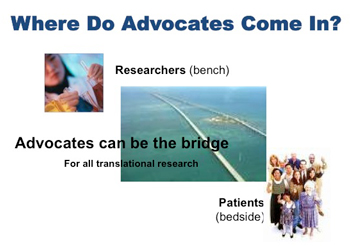Community advocates want the best science to be done, so patients in their communities may benefit.
Every institution that conducts clinical trials has an Institutional Review Board (IRB). This board reviews every clinical trial to assure that appropriate steps are taken to protect the rights and welfare of people participating in clinical trials.
Each comprehensive cancer center should have a Protocol Committee and a Data Safety Monitoring Board that reviews every study. Community advocates can apply to sit on these committees and attempt to insure that if members of their communities do participate that there are practices in place to protect them. The advocate role on this committee can vary, but may include:
The Food and Drug Administration (FDA) is the agency that controls drug development. It recruits patient representatives to participate as consumer and patient advocates on many different kinds of FDA committees. Community advocates can apply to sit on these committees as well.
Community advocates can build bridges between the communities they represent and the research community.
“Research advocacy is a vital activity for today’s patient community since patients provide a unique perspective in the research process, working with investigators, companies, and government agencies to accelerate progress against cancer."
New ideas are the basis for research that will impact patients. Community advocates are usually strong supporters of new ideas, and are able to inform the research community about what is important to the greater community.
- Community advocates will ask questions others won’t ask and they will ensure the discussion is focused on patient impact and relevance to patients.
Community advocates can be a great voice not only to the communities they represent but to a larger national community to gain support for research that directly affects the patient and/or the members of that community.
- Funders of cancer research like the Department of Defense Congressionally Mandated Research Program and Susan G. Komen encourage involvement of advocates and train them to become effective members of the program.
Community advocates have the ability to translate complicated research into “lay” language that members of their community will understand.
- And as mentioned, Inclusion of advocates in clinical research decisions fosters public trust.






